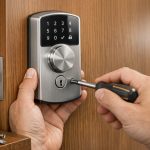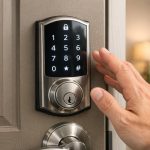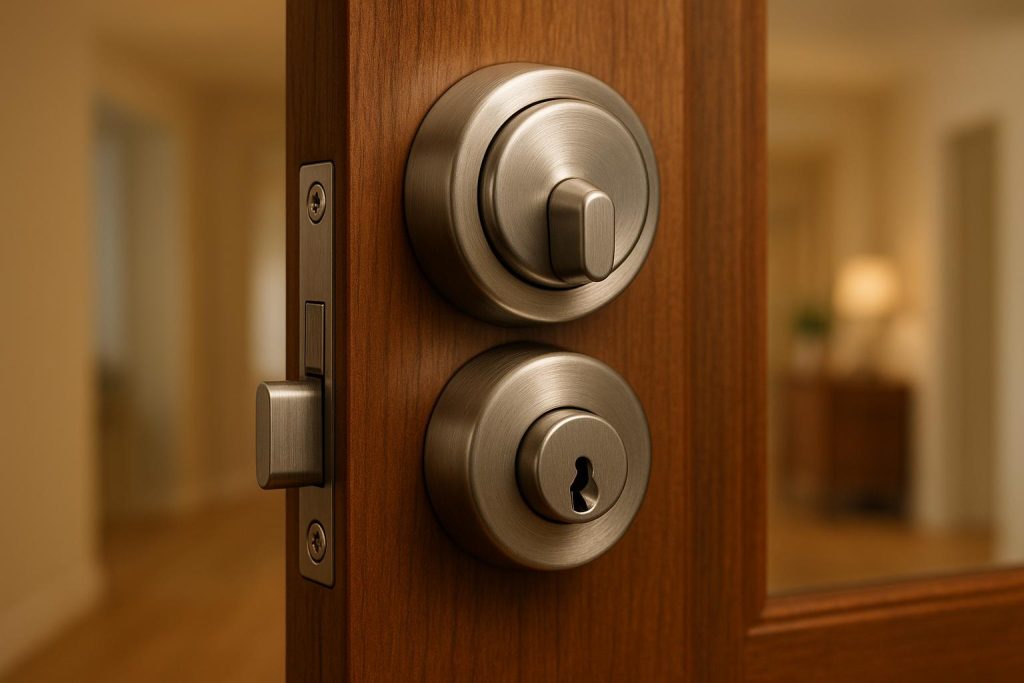When it comes to securing your property, standard locks might not cut it. High-security locks are built to resist common break-in methods like picking, drilling, and key duplication, offering a stronger defense for homes, businesses, and industrial facilities. Here’s what you need to know:
- Why Upgrade? Standard locks are vulnerable due to simple mechanisms and easily duplicated keys. High-security locks use tougher materials, advanced designs, and patented key systems for better protection.
- Assess Your Needs: Consider the type of property (residential, commercial, or industrial), local crime rates, and insurance or code requirements before choosing a lock.
- Types of Locks: Options include deadbolts, electronic locks, and specialty locks like mortise or padlocks, each suited to specific doors and security needs.
- Key Features to Look For: Resistance to picking and drilling, strict key control, and certifications like ANSI Grade 1 or UL 437.
- Professional Installation: Proper installation and regular maintenance are crucial for maximizing security and ensuring long-term reliability.
Investing in high-security locks not only protects your property but can also reduce insurance premiums and prevent costly break-ins. Always consult a certified locksmith for expert advice and installation.
Ask Mr Locksmith™| The Best Residential Door Lock?
How to Assess Your Security Needs
Choosing the right high-security locks starts with understanding what you’re protecting and the risks involved. This helps you find effective solutions that fit your budget.
Know Your Property Type
Different property types have unique security demands. Here’s a breakdown:
Residential Properties
For homes, focus on securing entry doors, sliding patio doors, and basement access points. Single-family homes benefit from strong deadbolts on front and back doors. Apartments and condos may need extra measures for shared building access. It’s also worth evaluating who has key access and how it’s controlled.
Commercial Properties
Businesses face more intricate security challenges. Retail stores need locks that balance easy customer access with theft prevention. Office buildings require systems to manage employee access to various areas while adhering to fire safety rules. Restaurants and service businesses need locks that can withstand high traffic and frequent key changes among staff.
Industrial Facilities
Security demands are highest for industrial sites. Warehouses storing valuable inventory need locks resistant to picking and physical attacks. Manufacturing plants often require specialized locks for equipment rooms, chemical storage, and loading docks. Integrated systems that track access by time and area are particularly useful here.
After identifying your property type, the next step is to evaluate environmental risks to refine your security approach.
Check Risk Factors
The risks your property faces will shape your security strategy. For example, local crime rates and the surrounding environment play a big role. Urban areas, busy streets, or locations with poor lighting often call for Grade 1 deadbolts and reinforced strike plates. Suburban areas might focus more on preventing lock picking, especially in neighborhoods with a rise in home invasions.
Walk around your property to spot weak points. Look for old locks, flimsy door frames, or areas with limited visibility. Pay attention to keys that are easy to duplicate and doors that stick or don’t close properly – these alignment issues can compromise a lock’s effectiveness.
High-traffic doors, like main entrances, need durable, tamper-resistant locks. Meanwhile, less frequently used doors, such as basement entrances or emergency exits, might require locks designed more for tamper resistance than daily convenience.
Once you’ve assessed the risks, make sure your lock choices align with insurance and legal requirements.
Meet Insurance and Code Requirements
Your locks need to meet specific standards to satisfy insurance policies and local codes. Here’s what to consider:
Insurance Standards
Homeowner policies often require deadbolts that meet ANSI Grade 2 standards, while commercial insurance may demand Grade 1 locks for certain coverage levels. Check with your insurance agent to confirm requirements – compliant locks may even reduce your premiums.
Building Codes
Local codes differ by municipality. Rental properties and commercial buildings may have specific lock requirements. Fire codes are especially important for emergency exits, which must allow quick, keyless egress. If your property serves the public, you might also need locks that comply with ADA regulations, ensuring they’re easy for individuals with disabilities to operate.
Business Licensing Requirements
Certain businesses, like retail stores selling alcohol, pharmacies, or those handling cash deposits, may face additional security standards. Professional services, such as law firms or medical practices, often need locks that protect client confidentiality and meet privacy regulations.
Getting these details right from the start can save you money and avoid compliance headaches later. Before purchasing locks, document the standards that apply to your property and ensure the locks you choose meet those requirements. This final step completes your security assessment, giving you confidence that your locks are both effective and compliant.
Types of High-Security Locks and Where to Use Them
Choosing the right lock for the job is essential to keep your property secure. Here’s a breakdown of different lock types and where they work best, helping you address specific security needs effectively.
Deadbolts
Deadbolts are a trusted option for securing exterior doors because they’re harder to force open compared to spring-loaded locks. For doors without glass panels, single-cylinder deadbolts are ideal. However, if a door has glass panels or sidelights, double-cylinder deadbolts provide extra protection by preventing access through broken glass. Just make sure to check local fire safety regulations before installing double-cylinder models.
For higher security needs, there are deadbolts specifically designed for tougher applications. In residential settings, single-cylinder deadbolts work well for main entrances, while double-cylinder deadbolts are better suited for doors near glass features. In commercial spaces, heavy-duty deadbolts are recommended for exterior doors, especially in areas with high foot traffic or public access.
Looking for added convenience? Electronic options might be the way to go.
Electronic and Smart Locks
Electronic locks bring modern functionality to your security setup. Keypad locks are a great choice for places like rental properties, offices with changing staff, or homes where keys tend to go missing. They let you set and update multiple access codes as needed. Smart locks take it a step further by integrating with home automation systems, offering remote control, notifications when unlocked, and even biometric authentication.
When selecting an electronic lock, make sure it has features like battery status alerts and a mechanical key override, so you’re not locked out during power outages or when the battery runs low. Keep in mind that extreme weather can sometimes impact their performance, so consider your environment before deciding.
For more specific security needs, specialty locks can provide targeted solutions.
Specialty Locks and Padlocks
Mortise locks, which are installed inside the door, are perfect for commercial properties or older buildings that require a sturdier locking mechanism.
Disc locks are designed to resist cutting and prying, making them ideal for storage units, trailers, and shipping containers – especially in outdoor environments where cutting tools might be used.
High-security padlocks with shackle protection offer strong security for gates, storage areas, and equipment. Meanwhile, cam locks are a practical choice for securing filing cabinets, mailboxes, and electrical panels. Many cam locks can also be integrated into master key systems, making them a favorite for facility managers who need to manage access across multiple areas.
For industrial settings, magnetic locks are a smart option for doors that need to unlock automatically during emergencies, like when a fire alarm is triggered. These locks keep doors secure during normal use but release instantly when the power is cut, ensuring safe evacuation.
What to Look for in High-Security Locks
High-security locks are designed with advanced features to combat common break-in methods like picking and drilling. Knowing what to look for can make all the difference in safeguarding your property.
Pick and Drill Resistance
These locks are built with precision and often include additional pins – seven instead of the typical five or six found in standard locks – to make picking significantly harder. Some models, such as those using the Abloy system, employ rotating disk mechanisms that offer an astonishing 1.9 billion key combinations. On top of that, their sturdy construction is specifically designed to withstand drilling attempts. But even the strongest lock can be compromised if key duplication isn’t tightly controlled, which brings us to the next critical feature.
Key Control
Key control is essential for preventing unauthorized key duplication, a vulnerability that can compromise your security. With a robust key control system, only authorized individuals can get copies of your keys, reducing risks from lost or unreturned keys and cutting down on the need for frequent rekeying. Many high-security locks combine resistance to physical attacks with advanced key control measures, offering a comprehensive approach to property protection. On top of that, verified product quality ensures these locks maintain their reliability over time.
ANSI/BHMA and UL Certifications

To ensure your lock delivers dependable security, check for certifications from trusted organizations like ANSI and UL. These certifications indicate that the lock meets rigorous security and performance standards. Choosing a lock with these endorsements provides added assurance that it will stand up to the demands of high-security environments.
sbb-itb-643e28e
Professional Installation and Maintenance
Even the most advanced high-security lock won’t do its job if it’s installed poorly or isn’t properly maintained. That’s why getting professional help for both installation and regular upkeep is just as important as choosing the right lock in the first place.
Why Choose Professional Installation?
High-security locks and systems need precise alignment to work as intended. Even a small misalignment can leave your property vulnerable.
Certified locksmiths are trained to handle the specific requirements of different lock types and brands. They ensure everything is installed correctly – reinforcing door frames, securely mounting strike plates, and making sure all parts work together flawlessly. Plus, improper installation can void warranties, so professional help adds an extra layer of protection.
Proper installation also sets the stage for future maintenance, which is key to keeping your security system in top shape.
The Importance of Regular Maintenance and Rekeying
Once your lock is installed, regular maintenance is essential to keep it functioning as it should. This includes lubricating moving parts, inspecting internal components, and ensuring electronic features are working correctly. Routine care helps prevent potential security gaps.
Rekeying is another critical service, especially if keys are lost or new occupants move in. Instead of replacing the entire lock, rekeying updates the internal mechanism so old keys no longer work. It’s a cost-effective way to maintain security without sacrificing quality.
Periodic security reviews are also a smart move. A professional locksmith can evaluate your property’s current risks and recommend upgrades or adjustments to address new security challenges.
Sherlock’s Locksmith Services
Sherlock’s Locksmith provides 24/7 locksmith services in Pittsburgh, PA, including new lock installations, rekeying, and security system upgrades.
Their expertise covers automotive, residential, and commercial needs. From access control systems and master key solutions to biometric locks, they’ve got you covered. They also handle emergencies like lockouts and broken key extractions.
For those looking to enhance security, Sherlock’s offers keyless entry systems, electronic locks, and integrated alarm systems. Their technicians stay updated on the latest advancements in security technology and can help you choose the best products to match your property’s specific needs and risks.
How to Choose the Right High-Security Locks
Choosing high-security locks involves three essential steps: identifying your specific needs, focusing on key features, and ensuring professional installation.
Start by evaluating your property and security requirements. Factors like location, property type, and even your insurance policy can influence your decision. For example, some insurance companies offer discounts for properties equipped with ANSI Grade 1 locks, which meet the highest security standards.
Next, dig into the technical details. The American National Standards Institute (ANSI) grades locks on a scale from 1 to 3, with Grade 1 locks providing the highest level of security and durability. Beyond the grade, pay attention to the materials and construction. High-quality locks are designed to resist common break-in methods like drilling, bumping, and picking.
Look for locks that include features like pick resistance, drill resistance, and bump protection. These are hallmarks of high-security models and can make a significant difference in safeguarding your property.
However, even the best lock won’t perform well without proper installation. Reinforcing weak points, such as upgrading to a heavy-duty strike plate secured with 3-inch screws, can significantly improve resistance to forced entry. This small, cost-effective upgrade can go a long way in enhancing overall security.
While high-security locks may have a higher upfront cost, they often pay off in the long run. Their durability can lower maintenance needs, potentially reduce insurance premiums, and minimize the financial impact of break-ins or property damage.
Equally important is working with certified professionals. An experienced locksmith can assess your property’s vulnerabilities, recommend the right level of security, and ensure the lock is installed correctly. Proper installation not only maximizes protection but also helps maintain warranty coverage.
FAQs
What makes high-security locks different from standard locks, and why should you upgrade?
High-security locks are crafted to offer greater protection than standard locks. Built with advanced materials and mechanisms, these locks are designed to withstand tampering techniques like picking, drilling, and bumping. Many also feature patented key systems, making it nearly impossible to duplicate keys without proper authorization.
Switching to high-security locks is a smart move to boost the safety of your home or business, especially if you’re looking for extra peace of mind. For those in Pittsburgh, PA, Sherlock’s Locksmith provides dependable locksmith services, including expert lock installation, repair, and 24/7 emergency support.
How do I choose the right high-security lock for my property?
Choosing the Right High-Security Lock
Selecting the best high-security lock begins with understanding the specific needs of your property. Think about the type of property you’re securing – whether it’s residential or commercial – the level of protection you require, and your budget. For maximum protection, Grade 1 locks are an excellent choice, often recommended for commercial spaces or homes that demand top-tier security. On the other hand, Grade 2 locks strike a balance between strong security and affordability, making them a solid option for most residential properties.
You’ll also want to consider how well the lock can withstand tampering techniques like picking or drilling. For areas housing sensitive information or valuable assets, it’s worth investing in locks with advanced security features. If you’re feeling unsure about your choice, a professional locksmith can guide you through the options and help you make the right decision. For expert advice and installation, Sherlock’s Locksmith is ready to assist with all your lock and security needs.
Why is professional installation important for high-security locks, and how does it enhance my property’s security?
Why Professional Installation of High-Security Locks Matters
Getting high-security locks professionally installed isn’t just a good idea – it’s a must if you want them to work as intended. Certified technicians know how to properly fit and secure these locks, ensuring they’re aligned with your property’s specific security requirements. This reduces weak spots and makes it much harder for anyone to tamper with them.
Another big advantage? Professional installation ensures your security system runs smoothly when it counts. You’ll face fewer risks of malfunctions, which means you can trust your locks to perform reliably over time. By choosing expert installation, you’re making a solid investment in the safety and dependability of your property.









